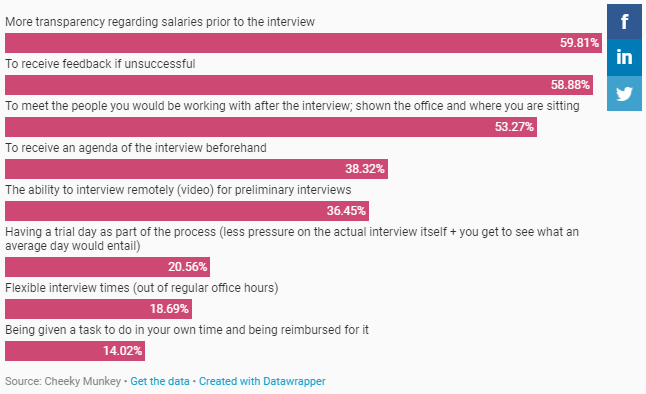Attracting top talent: 60% want salary transparency in interview process

60% of millennials want salary transparency – businesses should adapt recruitment model to attract young talent.
In an increasingly candidate-led market, it’s crucial to appeal to millennials as the generation that will grow from top talent to leaders in the field. Now is the time for recruiters to change their tried and tested tactics or risk losing this dominant sector of the workforce.
The Recruitment & Interview Process survey reveals where most young talent is searching for job roles, and key elements of the interview that engages millennials during the recruitment process.
Millennials are currently the largest generation in the workforce and by 2020 they are forecast to make up 35% of the global workforce, making them a key focus for recruiters.
Asking young talent how the interview process could be improved, results highlighted the need to focus on assimilation, feedback and transparency. When asked how the interview process could be improved:
- Over half (53%) of the respondents said they wanted to be shown where they would be sitting should they get the job
- 59% of millennials stated that receiving feedback after an unsuccessful interview would make the whole interview process better
- 60% of millennials want more transparency regarding salary before an interview takes place
- When asked for other ways in which the interview process could be improved, a third of millennials chose the ability to interview remotely for preliminary interviews
Don Byrne, recruitment sector consultant at Cheeky Munkey, states:
‘Candidate attraction and retention are intrinsic to the success of a recruitment agency and the survey highlights areas of key importance to millennials when they are choosing an agency. Revealing that the majority of millennials overwhelmingly favour an online job search, we must ensure we adapt to meet these candidate preferences.
The overarching message we discovered from the survey was recruitment should never be a ‘one size fits all’ process. While candidates will differ in what they place a value on, each and every one should be treated as an individual.’
How can the interview process be improved?
 Further results highlight some practical things recruiters can implement.
Further results highlight some practical things recruiters can implement.
Job-hunting millennials are shunning traditional recruitment methods, with only 18% favouring the direct approach from recruiters via LinkedIn, email or phone. Word of mouth is also out of favour with millennials, with only 19% using this as a way of finding their next role.
Online searches – whether via Google or directly on a company’s site – are the preferred job-hunting method for millenials, with a 52% and 51% respectively looking for a job this way.
The survey also found that 62% of millennials wouldn’t use a recruiter if their website is poorly designed, slow to respond or unsecure, so it’s a must to ensure your site is up to scratch.
Other important takeaways from this new survey include:
- Almost a third of millennials now use social media as their preferred method of searching for a job.
- 44% of millennials prefer to sign up to industry specific recruitment websites rather than high street (20%) recruitment companies
- 1 in 4 millennials surveyed stated receiving emails from a recruiter when they aren’t job hunting would put them off using that company in the future.
The findings of the survey highlight the need for recruiters to put millennial needs at the heart of their business and adapt to the group’s needs accordingly in order to survive in this highly competitive marketplace.











Responses